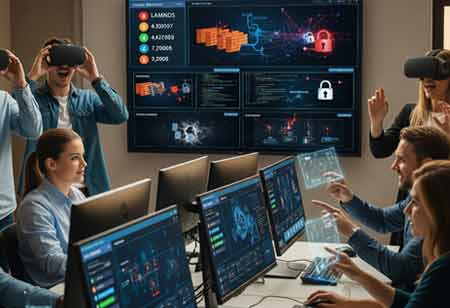THANK YOU FOR SUBSCRIBING
Create Futuristic Smart Cities
The adaptive city is a multi-year journey that involves a digital transformation.

By
Apac CIOOutlook | Thursday, March 16, 2023
Stay ahead of the industry with exclusive feature stories on the top companies, expert insights and the latest news delivered straight to your inbox. Subscribe today.
The idea of smart cities is a good place to start, but the future city must take an important step further. It must evolve into an adaptive city capable of dynamically reacting to ongoing change and disruption.
FREMONT, CA: The adaptive city is a multi-year journey that involves a digital transformation. It can achieve quick wins along the way, ensuring that benefits are realised at every stage. Establishing the vision, designing for adaptability, and then building for inherent agility are some essential steps in the implementation process.
Utilising Advanced Analytics
Advanced analytics can be used to interpret large volumes of data to help create smarter cities. By harnessing the power of predictive analytics, cities can get an understanding of what events may occur in the future and plan proactive responses. By understanding trends and pinpointing correlations, smart cities can develop predictive models that can improve city services and maintain efficiency.
Leveraging Connectivity Solutions
Connectivity solutions like the Internet of Things (IoT), Big Data, and cloud computing are enabling cities to become intelligent, interconnected, and more responsive to the needs of citizens. For example, by implementing connected sensors throughout the city, urban planners can access real-time information on energy usage, traffic flow, and more. With the power of connectivity, cities are able to monitor, analyze, and control their environment.
Implementing smart infrastructure
Smart cities leverage artificial intelligence, machine learning, and predictive analytics to deploy smart infrastructure. Smart infrastructure includes connected transportation systems, smart buildings, and intelligent energy networks that use renewable sources of power. In addition, smart cities can use automated systems to monitor and optimise the use of water, waste management systems, and recycling programs. These technologies can ensure that the efficiency and sustainability of the city are improved.
Improving Urban Livability, Effectiveness, and Productivity
The World Economic Forum is committed to supporting the creation of creative and perceptive solutions to challenging urban issues. By developing initiatives that encourage social mobility, modernise city services, and create a built environment that is more hygienic and reasonably priced, it hopes to work with partners to create an urban future that is more resilient and sustainable for every resident.
The biggest challenge will be the number of technical components that make up the dynamic city of the future. At this point, the adaptable city will develop into its own software firm, essentially improving the world. Additionally, it is said that every company is a software company so perhaps it is time for every city to follow suit.





